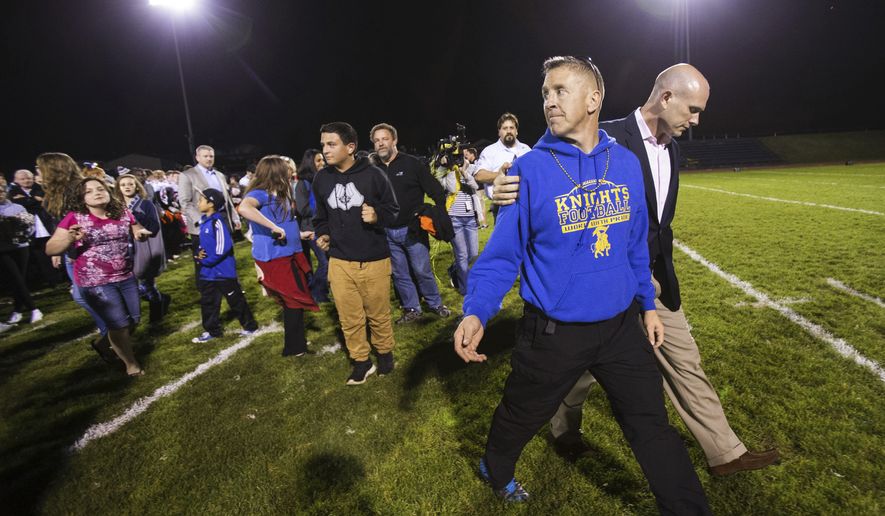The nine Supreme Court justices appeared split along ideological lines Monday in a challenge weighing the First Amendment rights of a high school football coach fired for praying on the 50-yard-line.
Joseph Kennedy, who coached high school football at Washington’s Bremerton School District for about eight years, would give thanks to God on the 50-yard-line after games. Sometimes he was joined by players, while other times he was not. The prayers lasted 15 to 30 seconds.
Mr. Kennedy said he did not coerce students to join him. Those who did join in did so voluntarily, he said. But once school officials learned of the prayer — seven years after he began his routine — lawyers intervened and the coach was eventually fired.
The Supreme Court began hearing arguments in the case Monday.
“He felt compelled to make his prayer there,” said Paul Clement, an attorney making the case for Mr. Kennedy.
Mr. Clement told the justices during oral arguments that the school district ended up discriminating against Mr. Kennedy out of fear it would be endorsing private prayer — a common mistake school districts make when policing speech and prayer, he added.
“A school does not endorse private religious speech just because it fails to censor it,” Mr. Clement said.
A lower court ruled in favor of the school district, but the Supreme Court agreed to review the case. And during arguments, the majority of justices signaled they were concerned over the district’s handling of the dispute.
“It’s an employment discrimination case,” said Justice Samuel A. Alito Jr.
The Supreme Court in a 1962 case ruled that requiring public school students to recite a school-written prayer in class was unconstitutional, but the high court has also protected free speech rights at public schools.
In the 1969 case Tinker v. Des Moines Independent Community School District, the justices ruled in favor of students who protested the Vietnam War while on school grounds, saying they do not “shed their constitutional rights to freedom of speech or expression at the schoolhouse gate.”
Richard Katskee, a lawyer for Americans United for Separation of Church and State representing the school district, said the coach made himself the center of attention with his prayers and coerced students to feel compelled to join.
Mr. Katskee also noted the district made efforts to accommodate the coach’s prayer, allowing him to do it away from the field.
“Coaches have far more power and influence especially at the time and place of those postgame speeches,” Mr. Katskee said. “Political and religious speech have to be treated the same way.”
But Justice Brett M. Kavanaugh pushed back against the allegation prayer was problematic when it was from someone becoming “the center of attention.”
“I don’t know how we would write an opinion about not making yourself the center of attention as the head coach of a game,” Justice Kavanaugh said.
The liberal wing of the court, though, expressed concerns over where and when the coach decided to pray.
Justice Stephen G. Breyer questioned why Mr. Kennedy had to pray at the 50-yard line immediately after the game instead of 10 minutes later.
“This doesn’t seem like a new problem. It just seems like a line drawing problem,” he said. “Do you see what’s bothering me?”
Justice Sonia Sotomayor suggested the school shouldn’t be stopped from intervening when an activity is causing a disruption.
“He is the one who chose to publicize his prayer,” she said. “I don’t know of any other religion that requires you to get at the 50-yard line.”
Mr. Clement pointed to famous athletes like football player Tim Tebow and Mo Salah, a Muslim soccer player, who display their faith on the fields.
The justices are expected to issue a ruling in the case by the end of June.
Robert Tuttle, a law professor at George Washington University, said although the justices sounded split ideologically, he thinks a ruling for the coach will have limitations.
“It’s most likely the court is going to rule for the coach but do so in a way that is almost counterfactual. In other words, is going to suggest limitations on the time and place of speech that are in fact inconsistent with what he was doing,” Mr. Tuttle said.
The case is Joseph Kennedy v. Bremerton School District.
• Alex Swoyer can be reached at aswoyer@washingtontimes.com.




Please read our comment policy before commenting.